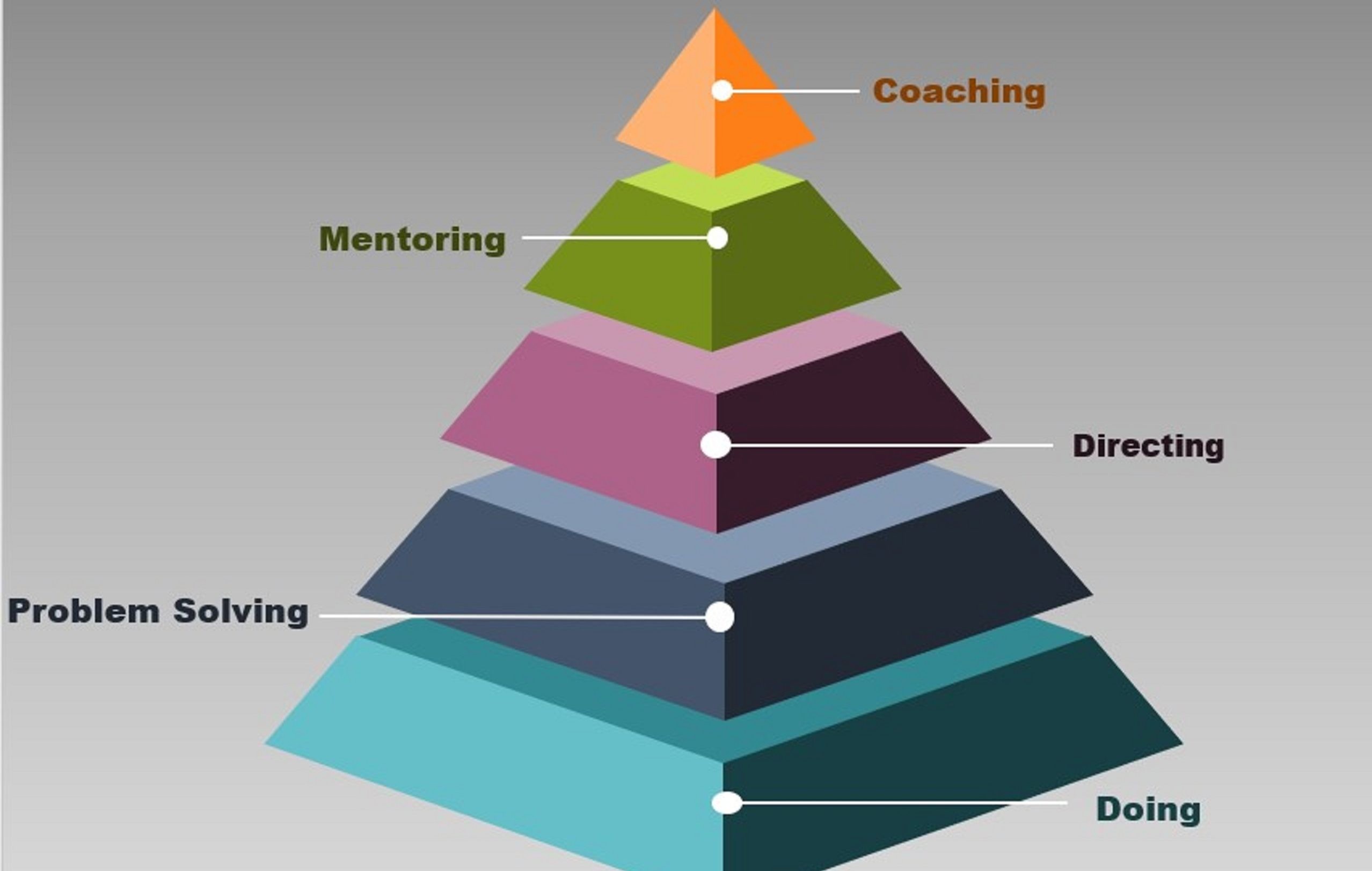It’s not a secret that in order to develop a sales team, management needs to spend more time coaching and mentoring and less time doing, problem solving and directing. Understanding the five levels of sales management is key in order for sales managers to focus on the levels that are the most productive.
As illustrated in the pyramid above, there is a hierarchy to effective sales management. Coaching and mentoring is at the top, representing the most productive efforts a sales manager can make. Many sales managers spend the bulk of their time at the bottom levels. confusing activities associated with problem-solving and directing with coaching.
A frequent challenge sales managers face is the lack of time to deal with all the management, coaching, sales strategy and operational tasks their job demands of them. This scarcity of time is compounded as the size of their sales teams and territories grow. Some of these time challenges are self-inflicted, as many sales managers repeatedly jump into high value opportunities and acting on behalf of their salespeople to clean up account issues, take over difficult contract negotiations, or close business.
Sales managers who are former “A-player” salespeople themselves are often susceptible to this pattern. They pride themselves on their sales skills and can find it difficult to adjust to the dual role of manager and coach. Much like a sports team coach, a good sales manager must have a process for coaching their sales team from the sidelines, rather than jumping onto the playing field and running the play themselves.
When observing most sales managers, we frequently see them workingfor their sales people as opposed to working with them. The sales people are programed to rely on their management as a trusted resource when they run into roadblocks or need something to present to a prospect. This could include proposals, presentations, meetings with higher level stakeholders, price concessions or even reaching out on behalf of the sales person to a prospect that has “gone dark.” While every sales manager we speak with will complain that they are overwhelmed and cannot replicate themselves, the reality is they actually thrive on this and get a sense of accomplishment from every situation they “fix.” Sales managers that focus on doing, problem-solving, and directing fail to leverage these regular opportunities to empower their sales people to become more self-reliant, and in turn prevent the development of a scalable and more manageable sales team.
The sales manager must adopt a process for mentoring and coaching in order to move past the focus on the lower levels of the pyramid and developing a scalable sales team. The notable difference in the higher levels of the management pyramid is that we are developing our people’s ability to think critically. A framework for resolving issues as a team replaces the sales manager taking over for the team or telling them what to do. Collaborating at this level is much different than passively asking reps what they would do or sharing experiential wisdom.
The key to transforming the sales manager into a trusted coach lives in the creation of repeatable and structured routines that enable continuous improvement. The challenge is to re-engineer the typical sales management routines and steer them away from the unstructured problem-solving mindset. We have discovered that the solution also requires a change in the way companies train their sales teams. Rather than implementing a sales process and training managers to support it, companies need to begin implementing a sales coaching process and train the sales people to follow it.
To help clarify this, simply observe the way most managers of “highly trained” sales teams execute deal debriefs, pipeline reviews, weekly calls and ride-alongs. While sales managers consistently perform these routines, they do so with an informal approach meant to move things along and close business rather than reinforcing a level of critical thinking.
A typical pipeline review serves as a perfect example. When asked about the percent-to-close for a specific opportunity, a sales person may respond with a subjective assessment: “we had a great meeting, they really liked our demo and I give this a 75% chance of closure.” The sales manager responds, “do you need me to jump in and help you close it?” Right away, you can see how the manager’s directing, doing, and problem-solving approach leads to inaccurate pipeline projections and zero lessons learned. Replace this subjective approach with a specific set of sales criteria for assigning the pipeline stage and percentage. Coaching the sales people to fulfill the criteria leads to greater accuracy for the pipeline as well as instilling a more thorough approach to the sales process.
Moving an organization from endless problem solving to becoming a scalable coaching culture demands that the ongoing daily discussions about opportunities, sales calls, negotiations and even prospecting behavior become integrated within the sales organization. Consistent, scalable, and long-term sales success is the result when leadership adopts a mentoring and coaching model.
Sales Management



